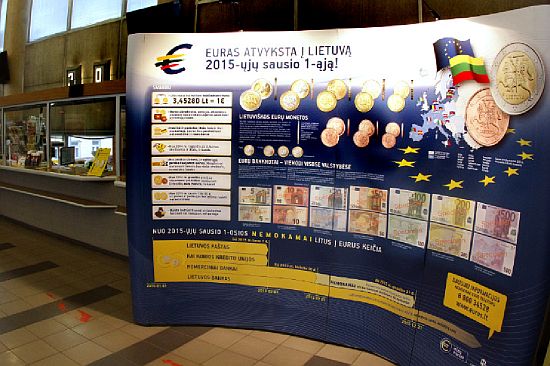EU – Baltic States, Financial Services, Legislation, Lithuania
International Internet Magazine. Baltic States news & analytics
Thursday, 22.05.2025, 05:48
Three Baltic States are having common currency
 Print version
Print version
 |
| Euro information poster in a Vilnius’ mall |
Transitional period
From January 2015, Lithuanians start withdrawing euro cash and paying for their purchases in euro. During the year, the euro will gradually replace the litas as the currency of Lithuania. There will be a dual circulation period of two weeks, during which the two currencies will be in use alongside each other in order to allow for a progressive withdrawal of Lithuanian litas.
When receiving a payment in litas, the change will be given in euro. This has been made possible thanks to thorough preparations ahead of the introduction of the single currency.
About 340 mln Europeans in 19 EU member states now share the same currency, which is a major achievement for Lithuania and for the euro area as a whole.
Completed Baltic States’ euro area
European Commission Vice-President, Valdis Dombrovskis from Latvia responsible for the common currency underlined that Lithuania's accession marked the completion of the Baltic States' journey to the heart of the EU’s political and economic development.
He said that this was a symbolic moment both for Lithuania and for the euro area itself, which remains stable, attractive and open to new members.
He expressed hope that the Baltic States' membership in the euro area will strengthen the economy of the region by making it even more attractive to businesses, trade and investment.
Commissioner for Economic and Financial Affairs, Pierre Moscovici said that in joining the euro, the Lithuanian people have chosen the area of stability, security and prosperity. He added that Lithuania had a strong track record of sound fiscal policies and structural reforms, which have delivered some of the highest growth rates in Europe, coupled with steadily falling unemployment. “The country is well-placed to thrive in the euro area, he concluded".
More on Lithuania’s adherence to euro:
= Press release - Lithuania becomes the 19th Member State to adopt the euro;
= President Juncker's video message on Lithuania joining the euro area;
= Vice-President Dombrovskis' message on Lithuania joining the euro area;
= The European Commission's website on Lithuania and the euro;
= Lithuania's national changeover website;
= More information on the euro
Source: http://ec.europa.eu/news/2015/01/20150101_en.htm








 «The Baltic Course» Is Sold and Stays in Business!
«The Baltic Course» Is Sold and Stays in Business!

